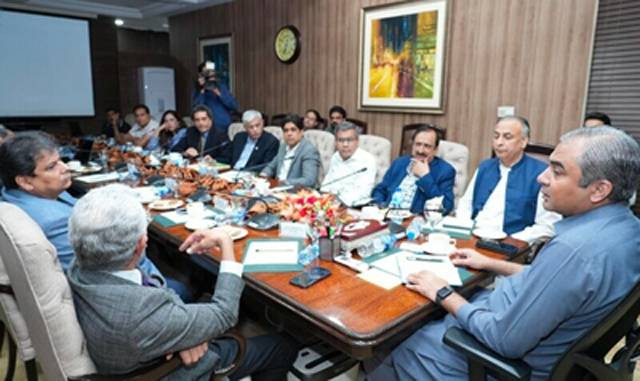LAHORE - Following the outbreak of conjunctivitis in Punjab, the provincial caretaker government has banned sale of Avastin injection and ordered removal of the existing stocks from the market pending the completion of a thorough inquiry. In a statement, the caretaker Chief Minister Mohsin Naqvi affirmed the Punjab government’s commitment to providing free treatment to those affected by this medical crisis.
Mohsin Naqvi also instructed officials to take punitive measures against drug inspectors found guilty of negligence in the cities where patients suffered from vision impairment. Furthermore, he tasked the Punjab Healthcare Commission with conducting a comprehensive evaluation of the clinics involved.
During a crucial meeting held at the CM Office on Sunday, eye specialists presented detailed insights into the usage of the injection and its administration. The meeting also addressed preventative measures and strategies to combat conjunctivitis. The Health Secretary provided a comprehensive overview of conjunctivitis and the risks associated with administering injections to patients.
It was emphasized during the meeting that conjunctivitis is a treatable condition, and government hospitals are equipped with the best facilities for its management. As a preventive measure, children afflicted with conjunctivitis will be sent home, and conjunctivitis patients will not be allowed in crowded areas or government offices. The briefing further highlighted that conjunctivitis primarily spreads through close contact and is characterized by symptoms such as redness of the eyes, watery discharge, inflammation, and itching. Patients were strongly advised not to touch their eyes. The majority of cases of vision impairment were reported in various Punjab cities including Lahore, Multan, Rahimyar Khan, Khanewal, Kasur, and Bahawalpur. The meeting was attended by provincial ministers Dr. Javed Akram, Dr. Jamal Nasir, and Amir Mir, as well as Chief Secretary, Secretary School Education, Secretary Higher Education, Secretary Information, and eye specialists Dr. Asad Aslam, Dr. Huma, Dr. Khalid Waheed, and Dr. Hamid Ayoub, along with relevant officials.
Meanwhile, an FIR was filed in response to the distressing scandal that came to light when 12 diabetic patients in Lahore and Kasur lost their eyesight after receiving defective Avastin injections. The authorities have taken action against the alleged makers of these faulty injections. The FIR was registered following the revelation of the scandal in the provincial capital. It was filed at the Faisal Town Police Station based on a complaint by the Deputy Drug Controller. The accused individuals, including Naveed Abdullah and Bilal Rashid, who are allegedly connected to the production of the defective drug, have been named in the FIR.
Additionally, a private hospital in Model Town has also been implicated. The lodged FIR alleged that Naveed Abdullah supplied these injections in Lahore and Kasur, leading to patients contracting Endophthalmitis disease. According to the FIR, a drug control team conducted a raid on the private hospital in Model Town, however, the accused were not present at the time. Nevertheless, the authorities seized equipment found in the hospital.
The FIR also points out that the defective eye injection was being manufactured illegally, alongside the production of other illegal and unregistered drugs in a private hospital in Lahore. Once the scandal was brought to public attention, the Health Minister, on the directives of the chief minister, initiated an inquiry and issued directives to halt the distribution of these injections across Punjab, including Lahore. In this regard, an investigation committee established by the Punjab government, chaired by Dr. Asad Aslam, held a meeting. It was decided during the meeting to reach out to other districts for further investigation into the matter. Dr. Asad Aslam, heading the investigation committee from King Edward Medical University, along with other members including Prof Dr. Mohsin from Services Hospital, DG Drugs Control Muhammad Sohail, Dr. Muhammad Moin from Mayo Hospital, and Dr. Tayyaba from Lahore General Hospital, conveyed their findings. Based on preliminary findings, the market price of the injection varied between 28 thousand to 40 thousand rupees. The manufacturers were extracting 80 doses from a single injection, and each of these extracted doses was being sold for approximately Rs 1400 to Rs 2000 in the market. This lower-cost dose was primarily accessible to low-income individuals, generating a profit of approximately 1.5 lakh from each injection. These injections were exclusively administered to various private and eye trust hospitals in Punjab. The investigation committee has decided to collaborate with other districts to further probe this matter, with drug inspectors from various Punjab districts assigned to the task. Dr. Asad Aslam emphasized that this infection was a result of the use of unsterilized injections and stressed the importance of taking serious measures to prevent such incidents in the future.






